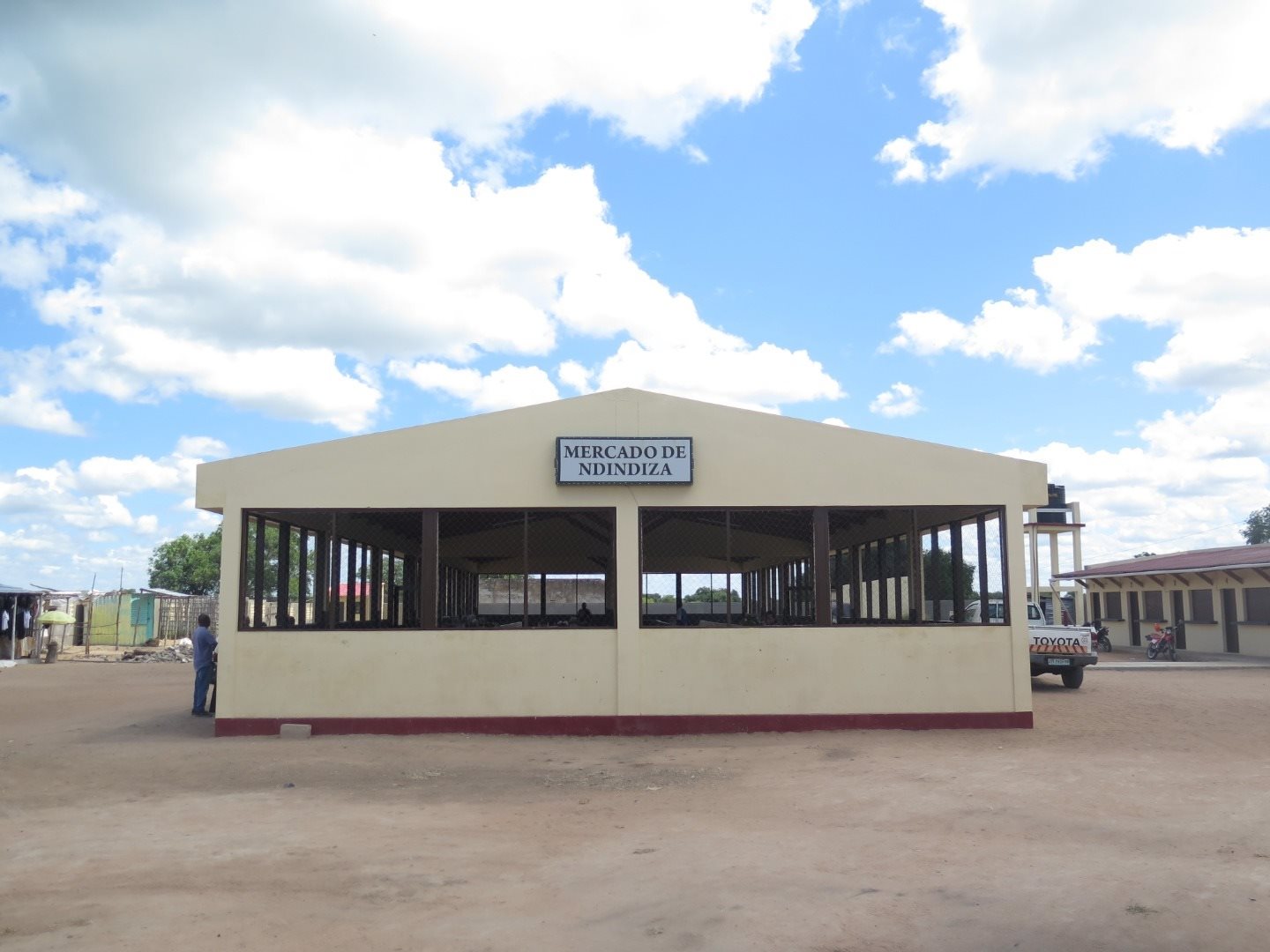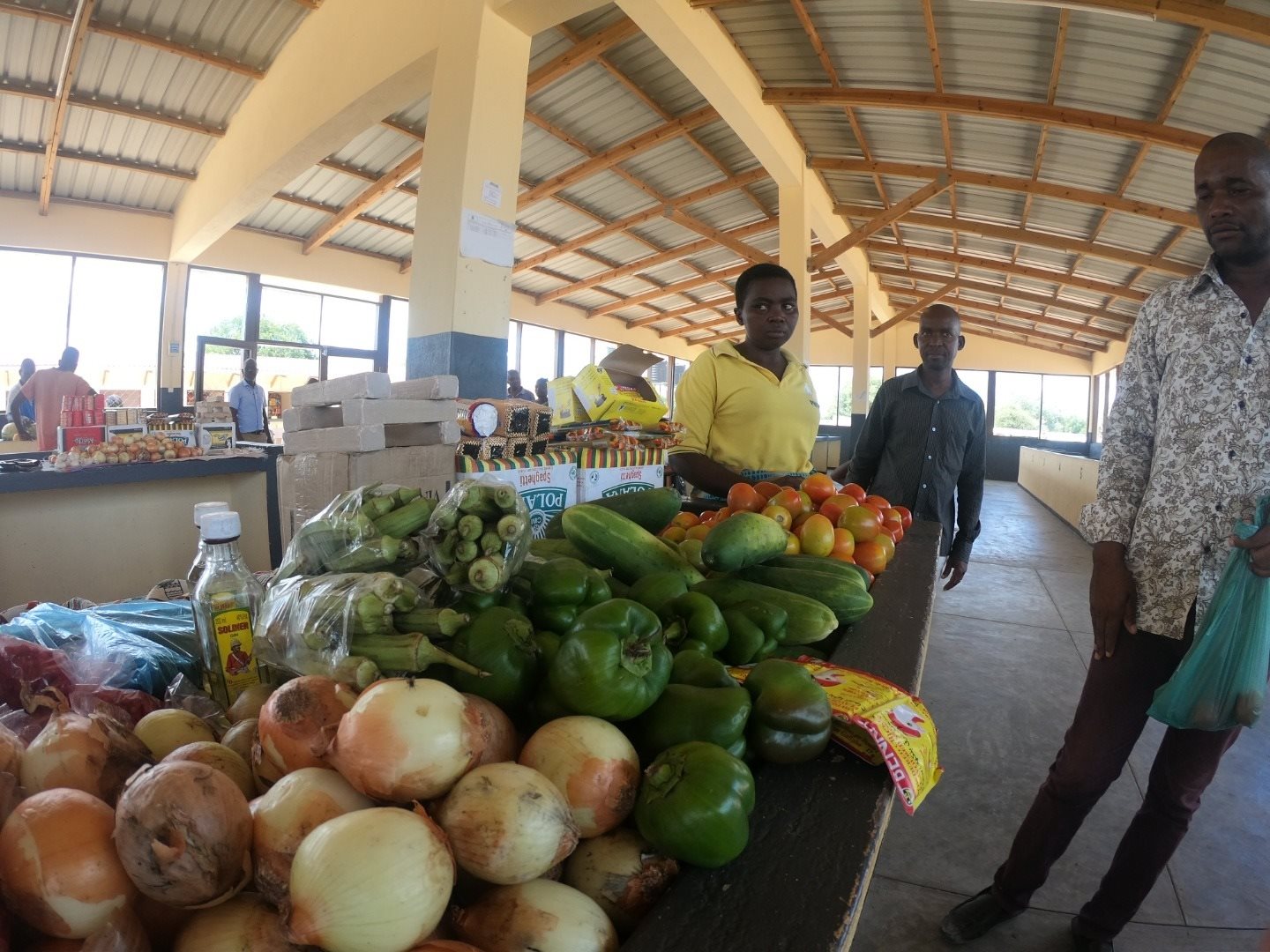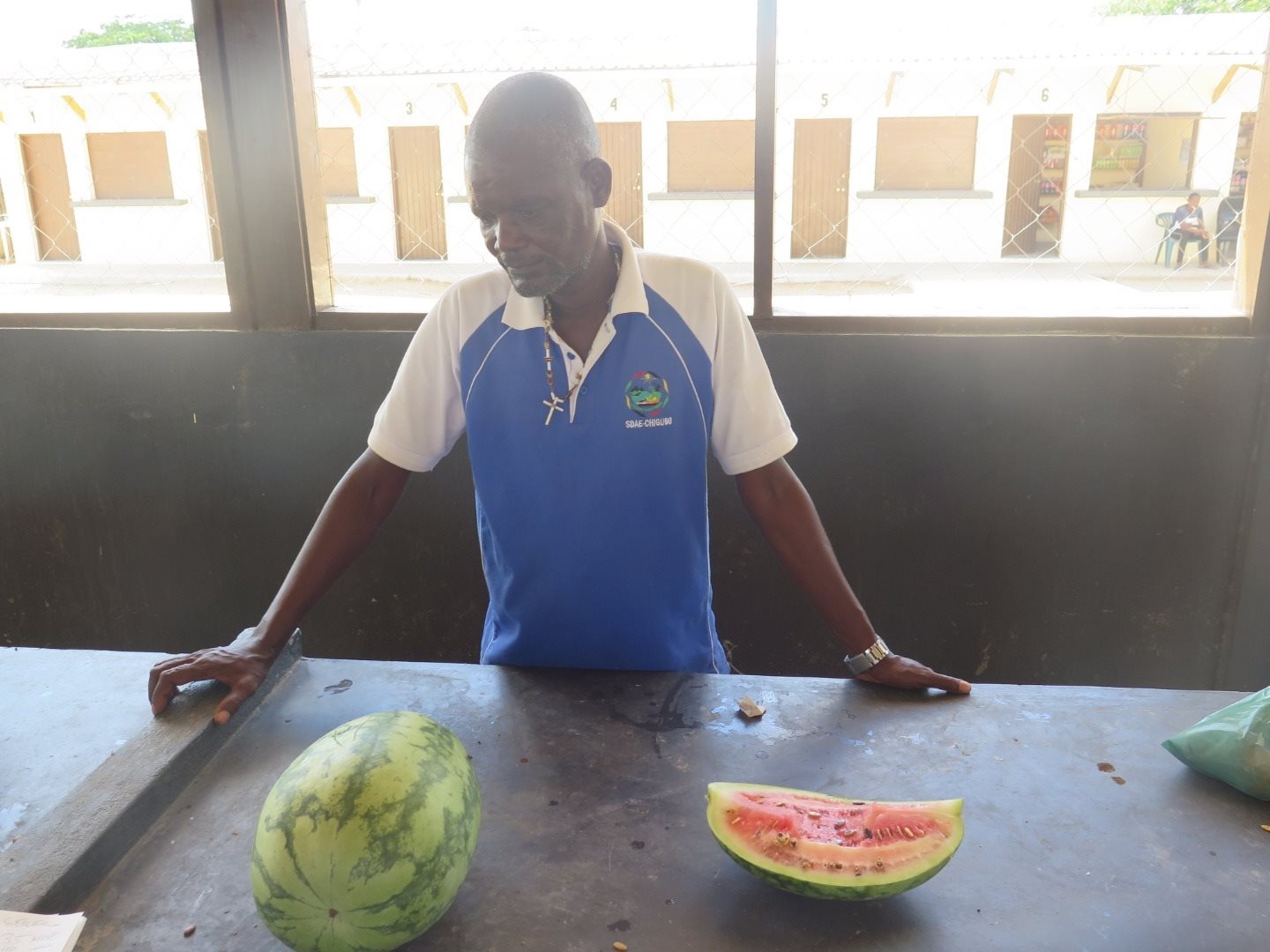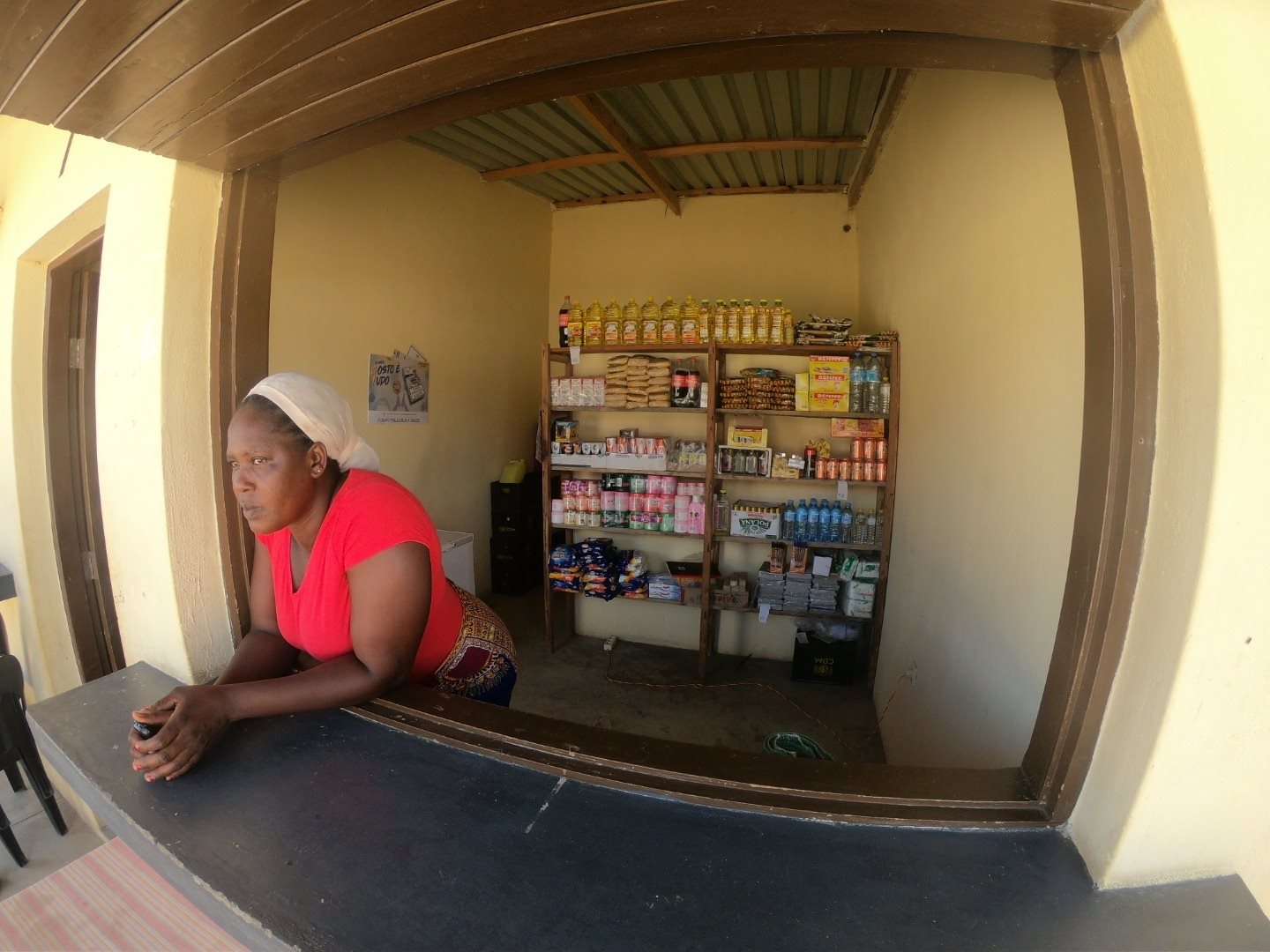New market opens doors in rural Mozambique
Tags
“Although I live around half a kilometer from the market, I find that the new building provides more protection for the crops I bring from Chokwe on a weekly basis,” Sandra Paulo Sibia, 31, explains as her child plays with other children under the roof of the newly-constructed Mercado De Ndindiza. Her customer, Maria Sabão Sombane, 25, mentions that Sibia has the freshest tomatoes and onions in town – a result Sibia partially attributes to the fact that the market’s infrastructure protects her products against unpredictable weather and the congregation of sellers has allowed for information exchange that helps her better store and manage the goods.
 The Mercado De Ndindiza is the new market in the hard-to-reach Chigubo District – the largest in Gaza province. The district is located on the eastern side of the province, which in size is larger than Sierra Leone but only has a population of 1,446,654, according to the 2017 census. The province shares its western border with South Africa and Zimbabwe.
The Mercado De Ndindiza is the new market in the hard-to-reach Chigubo District – the largest in Gaza province. The district is located on the eastern side of the province, which in size is larger than Sierra Leone but only has a population of 1,446,654, according to the 2017 census. The province shares its western border with South Africa and Zimbabwe.
The new building replaces an old market in Ndindiza town that consists of a number of precarious mud houses supported by poles cut from tree branches to keep them erect . From this market, which has no sanitation or rubbish collection, the marketeers formerly sold their produce. Upon visiting the site, most of the buildings appeared to be dilapidated and neglected. This is partly due to the recurring strong rains and heavy winds that hit the area, and more recently, to the opening of the new market which has offers greatly improved conditions for the marketeers.
The Permanent Secretary of the Governorate of Chigubo, Jaime Alberto Mugabe, explains: “We are often subject to unpredictable and cyclical weather conditions – ones that are not tied to the changing of the seasons, this makes it hard to protect both the crops and the old market.” He remembers a time when the situation was so dire there was no end in sight. In 2013, the province was hit with torrential rains that caused severe floods which killed 26 people and displaced approximately 65,000 others. Mugabe recalls a time when the flooding had not only cut off road transport and shut down the market for a while, but when they had to rely on UN support for the supply of food and clean water, and the delivery of human response efforts.
 In 2017, due to a lack of rain and uncharacteristically dry conditions, the province also lost around 10,000 hectares worth of crops, including that of vital crops like maize and beans, which form the basic diet for the majority of the population. This is why the construction of the new market has been essential to the livelihoods of the people of Chigubo. Not only has the new construction provided them with a venue to sell their goods, but has also provided shelter from the weather, storage spaces for their perishable goods, longer dwelling times for the customers and a community center to exchange knowledge, which has allowed for diversity of goods and services.
In 2017, due to a lack of rain and uncharacteristically dry conditions, the province also lost around 10,000 hectares worth of crops, including that of vital crops like maize and beans, which form the basic diet for the majority of the population. This is why the construction of the new market has been essential to the livelihoods of the people of Chigubo. Not only has the new construction provided them with a venue to sell their goods, but has also provided shelter from the weather, storage spaces for their perishable goods, longer dwelling times for the customers and a community center to exchange knowledge, which has allowed for diversity of goods and services.
Sibia, who brings her one-year old girl Taifa with her to the market, said that her daily income has increased about 200 Mozambican Meticais (Approximately US $3) – a 20 percent raise from her daily income at the last market. She now can afford to bring other goods that are in high demand like chicken stock and okra to Chigubo.
Another vendor, Eugênio Vasco Chiluvane, 53, is a farmer who grows a range of crops including watermelon. He comes to the market to sell the products that he has cultivated on his land. He has been a farmer in this area for 20 years and provides for his entire family (wife and 5 children) with the income from selling his produce. He explained that his new stall at the market allows him to sell his products every day. He recognizes that this is because customers are more likely to stay in the new building because they are protected from the sun, rain and wind. This has given him extra free time, which he now uses to create necklaces out of watermelon seeds to sell.

The new market has 56 stalls in the main building and an annex with 12 shops selling a range of food and other basic necessities. It also has a butchers shop selling locally produced meats. One shop owner, Jotelina Chechong, 35, now sells at two shops – one in the old market and the other in the new market. She has 3 children in school and realized having two shops would be a good way to save for their future and increase the household income. The new shop, however, allows her to properly store her frozen meats and canned fish, whereas, the old shop only allowed for her to keep non-perishable goods like biscuits, soybeans and back-to-school notebooks. The shop in the new market is shaded and has storage space for the goods. Another great advantage which the new market has over the old one is sanitation, with toilets for the sellers and buyers and adequate quantities of clean, drinkable water which is pumped from a borehole close to the market.
In the old market there is no sanitation, the products are not protected. Chechong would have to bring them back and forth to and from her home every day. Having a shop in the new market has saved her a lot of time as it cut down the number of trips she has to travel to Chókwè city, almost 200 kms away on a dirt road, where she buys many of the products that she resells. The travel time from Chigubo to Chokwe is approximately 3.5 hours each way with very limited modes of transportation.
“The money I make from the shops allows me to buy cattle and also put some in the bank for my children. I also have dreams of opening a grocery store in the area,” said Chechong.
“We are very happy with the new market and the opportunities it has given us. It has, in many ways, become a central meeting point for all sellers in the district, which is great because the old market was out of commission for extended periods of time during the year,” said the Permanent Secretary of Chigubo, Mugabe. The opportunities extends to more capacity to collect local revenue as a new dynamic caused by this new market, which will certainty bring the most and relevant local economic operators to the same place - facilitating and helping local finance.
 “With the recent events that we have witnessed in this country with Cyclone Idai, we can really see that the devastation that extreme climatic events cause and the massive disruption to the livelihoods of thousands of poor, predominantly rural families. For us, it’s very important to support something that is locally-based and it is building on all the structures and institutions and finance systems that are already existing in this country, and therefore we believe this is the most sustainable way to work on climate change adaptation and building resilient local communities,” informed Malin Synneborn Lundberg, First Secretary at Embassy of Sweden in Mozambique.
“With the recent events that we have witnessed in this country with Cyclone Idai, we can really see that the devastation that extreme climatic events cause and the massive disruption to the livelihoods of thousands of poor, predominantly rural families. For us, it’s very important to support something that is locally-based and it is building on all the structures and institutions and finance systems that are already existing in this country, and therefore we believe this is the most sustainable way to work on climate change adaptation and building resilient local communities,” informed Malin Synneborn Lundberg, First Secretary at Embassy of Sweden in Mozambique.
The new market has been delivered by the local government of Chigubo, with development finance assistance of Sweden and Belgium, with UNCDF technical support. The Local Climate Adaptive Living Facility (LoCAL) programme aims to improve the livelihoods of people in the least developed countries (LDCs) through improving access to climate finance. LoCAL reinforces government systems to channel global climate adaptation financing to the district level, helping local governments to cope with the increased cost of building resilience against climate change and natural disasters.
Ramon Cervera, The UNCDF Programme Manager in Mozambique, has asserted: “Our efforts to help build climate resilient infrastructure in rural Mozambique is essential to protecting vulnerable communities against environmental and financial shocks. It is especially important that we do this alongside the local governments who are better equipped to cater to the needs of the local communities as this results in sustainable projects that are under the local governments’ jurisdiction.”
Quotes and information translated from XiChangana to Portuguese to English. Written by Nasser AlQatami. Pictures by Nasser AlQatami.